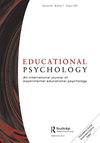计算估计策略的发展:一项针对6至7岁儿童的纵向研究
IF 3
2区 心理学
Q1 EDUCATION & EDUCATIONAL RESEARCH
引用次数: 0
摘要
研究表明,儿童的简单估计能力在5岁时就已经开始发展,但人们对这种估计能力的早期发展及其背后的策略知之甚少。本研究对332名小学一年级至二年级儿童的估计能力和策略进行了纵向跟踪,通过即时逐项口头报告收集了14个加法项目分为6个数字大小水平的策略信息。一年级和二年级的孩子都已经使用了显示出对计算估计基本理解的策略。例如,他们的语言表达表明,他们知道一个好的估计必须接近确切的答案,而不一定与它一致。除了这些基本的计算估计策略外,我们观察到这些孩子越来越迫切地希望通过精确算术来解决计算估计问题。讨论了在小学数学教育中早期引入计算估计的意义。本文章由计算机程序翻译,如有差异,请以英文原文为准。
The development of computational estimation strategies: a longitudinal study with 6- to 7-year-olds
Abstract Research showed that the capacity of making simple estimations begins to develop already at the age of five, but little is known about the early development of this estimation capacity and the strategies that underly it. The current study longitudinally followed the estimation capacity and strategies of 332 children from first to second grade of primary school by gathering strategy information through immediate trial-by-trial verbal reports on 14 addition items divided over six number size levels. Both in first and second grade children already used strategies that exhibited a basic understanding of computational estimation. For instance, their verbalizations suggested that they knew that a good estimate had to be close to the exact answer without necessarily coinciding with it. In addition to these rudimentary computational estimation strategies, we observed an increasing urge in those children to solve computational estimation problems by means of exact arithmetic. Implications for the earlier introduction of computational estimation in primary mathematics education are discussed.
求助全文
通过发布文献求助,成功后即可免费获取论文全文。
去求助
来源期刊

Educational Psychology
Multiple-
CiteScore
6.40
自引率
6.20%
发文量
57
期刊介绍:
This journal provides an international forum for the discussion and rapid dissemination of research findings in psychology relevant to education. The journal places particular emphasis on the publishing of papers reporting applied research based on experimental and behavioural studies. Reviews of relevant areas of literature also appear from time to time. The aim of the journal is to be a primary source for articles dealing with the psychological aspects of education ranging from pre-school to tertiary provision and the education of children with special needs. The prompt publication of high-quality articles is the journal"s first priority. All contributions are submitted "blind" to at least two independent referees before acceptance for publication.
 求助内容:
求助内容: 应助结果提醒方式:
应助结果提醒方式:


